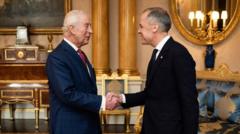In a landmark invitation, Prime Minister Mark Carney has asked King Charles III to officially open the 45th session of Canada's Parliament, a significant political move reflecting Canada's complex relationship with the British monarchy. This historical visit marks the first time a British monarch has addressed Canada's Parliament since 1977, signaling a shift in political tone and a reaffirmation of Canadian identity amid U.S. pressures.
A decade prior, Canadian politics witnessed turmoil under former Conservative Prime Minister Stephen Harper, who emphasized ties to the monarchy by replacing local artwork with a portrait of Queen Elizabeth II. This move faced backlash for being out of step with contemporary Canada, which has steadily sought to distance itself from its colonial past while maintaining its ties to the Crown.
The invitation to King Charles marks a symbolic resurgence of Canada's relationship with the monarchy, particularly as a counterstatement to President Trump's assertions that Canada is akin to America's "51st state." Carney's administration aims to project Canada's distinct national identity, with historian Justin Vovk suggesting it is a "theatrical display" asserting Canada's sovereignty.
Historically, Canada's ties to the monarchy have ebbed and flowed. Significant changes occurred in the 1960s and 1982 when then-Prime Minister Pierre Trudeau repatriated Canada's constitution, signalling a move towards complete legislative independence. However, the monarchy has remained a part of Canada's political identity.
Carney's invitation hints at his government’s pro-monarchy stance, quite different from recent Liberal administrations. The King's presence reinforces Canada's status and independence at a time when Trump's past comments and tariffs have raised doubts about Canada's sovereignty.
Despite mixed feelings among Canadians regarding the monarchy, this royal visit aims to convey unity and respect for tradition that transcends partisan politics. It also aligns with Carney's ambition to strengthen Canada’s ties with Europe while seeking allies in the diverse geopolitical landscape.
The royal engagement will be short-lived, lasting just over a day, but it aims to leave an "impactful" mark on the relationship between the monarchy and Canadian citizens. King Charles' first official visit as the reigning monarch comes at a critical moment, coinciding with ongoing discussions about the monarchy's role and the historical treatment of Indigenous peoples.
As Canada prepares for this emblematic visit, the political message is clear: this is not merely a ceremonial affair but a declaration of sovereignty, identity, and a reaffirmation of Canada's place on the world stage.
A decade prior, Canadian politics witnessed turmoil under former Conservative Prime Minister Stephen Harper, who emphasized ties to the monarchy by replacing local artwork with a portrait of Queen Elizabeth II. This move faced backlash for being out of step with contemporary Canada, which has steadily sought to distance itself from its colonial past while maintaining its ties to the Crown.
The invitation to King Charles marks a symbolic resurgence of Canada's relationship with the monarchy, particularly as a counterstatement to President Trump's assertions that Canada is akin to America's "51st state." Carney's administration aims to project Canada's distinct national identity, with historian Justin Vovk suggesting it is a "theatrical display" asserting Canada's sovereignty.
Historically, Canada's ties to the monarchy have ebbed and flowed. Significant changes occurred in the 1960s and 1982 when then-Prime Minister Pierre Trudeau repatriated Canada's constitution, signalling a move towards complete legislative independence. However, the monarchy has remained a part of Canada's political identity.
Carney's invitation hints at his government’s pro-monarchy stance, quite different from recent Liberal administrations. The King's presence reinforces Canada's status and independence at a time when Trump's past comments and tariffs have raised doubts about Canada's sovereignty.
Despite mixed feelings among Canadians regarding the monarchy, this royal visit aims to convey unity and respect for tradition that transcends partisan politics. It also aligns with Carney's ambition to strengthen Canada’s ties with Europe while seeking allies in the diverse geopolitical landscape.
The royal engagement will be short-lived, lasting just over a day, but it aims to leave an "impactful" mark on the relationship between the monarchy and Canadian citizens. King Charles' first official visit as the reigning monarch comes at a critical moment, coinciding with ongoing discussions about the monarchy's role and the historical treatment of Indigenous peoples.
As Canada prepares for this emblematic visit, the political message is clear: this is not merely a ceremonial affair but a declaration of sovereignty, identity, and a reaffirmation of Canada's place on the world stage.



















